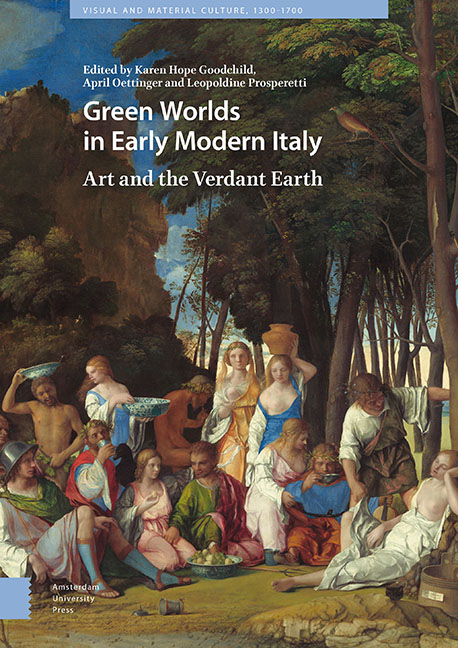Book contents
3 - ‘Honesta voluptas’: the Renaissance Justification for Enjoyment of the Natural World
Published online by Cambridge University Press: 21 November 2020
Summary
Abstract
The paper sketches the emergence of the oxymoron ‘honesta voluptas’, which was applied especially to gardens in Renaissance Rome. The phrase was picked up by Erasmus in his colloquy ‘Convivium Religiosum’, which, set in an ideal villa, argues one way or other, with classical references, current attitudes towards nature and paintings of nature. The interest of this text for art history is considerable and a commentary, expanding its allusions, is provided. The colloquy moralizes from fauna (like the Adagia) and derives from nature the ontological argument for God. This paper also suggests a new source for Durer's Pupilla Augusta and that Giorgione's Three Philosophers are studying nature as a ‘book’ that leads to God.
Keywords: Gardens, Rome, Erasmus, Ekphrasis, Villa, Book of Nature
Pleasure is sinful. Or is it? This question was posed by Lorenzo Valla in his dialogue originally with the title of De voluptate et vero bono – it was later modulated to less incendiary formulations. The first draft of this work, which he continued to modify, dated from 1431. The dialogue reprised the ethical debate between the ancient Stoics and Epicureans, which for the Middle Ages had been decided incontrovertibly by Cicero and Seneca for the Stoics. Valla, with irrefutable arguments, destroyed the Stoic position, which opposed virtue, or what was right and good (honestum), to pleasure (voluptas). This was revolutionary because any possible conciliation of honestum and voluptas had been specifically rejected by Cicero in De finibus bonorum et malorum and elsewhere, and subsequently the two terms remained firmly in opposition. Essentially Valla demonstrated the existence of pleasure in every human action – even and not less in the exercise of virtue – an inescapable pleasure because proprioceptive. Valla did not advocate Epicureanism in the place of Stoicism, however, although he enjoyed shockingly pursuing his argument to some of its logical conclusions. Instead he rejected the antithesis of Stoic and Epicurean as misconceived, and moreover pagan, substituting a proclaimed Christian ethics, conscious of the afterlife. This, however, was, it seems, a resolution insufficiently conclusive for his predominantly clerical readers, and failed to calm the susceptibilities his empiricism had provocatively aroused.
- Type
- Chapter
- Information
- Green Worlds in Early Modern ItalyArt and the Verdant Earth, pp. 69 - 86Publisher: Amsterdam University PressPrint publication year: 2019

